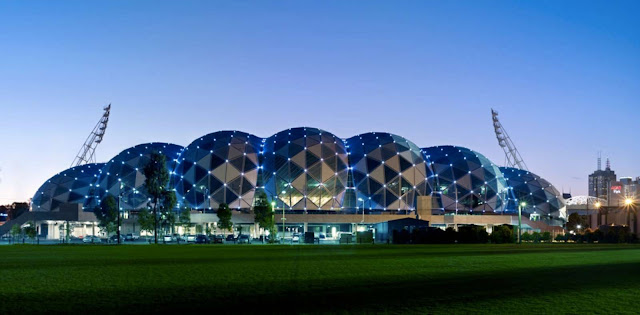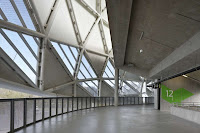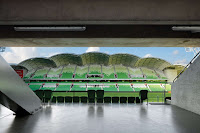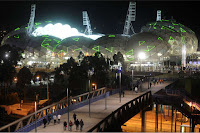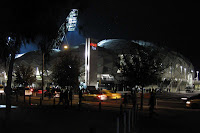Located about 1km to the east of the CBD and nestled between the Yarra River and the MCG, AAMI Park features a cutting-edge Bioframe design with a geodesic dome roof which substantially covers the seating area.
“AAMI Park continues the strong architectural lineage of Melbourne and Olympic Parks evidenced since 1956 by the Myer Music Bowl and Olympic Pool Complex, and later by Rod Laver Arena and the MCG.
It represents a move forward by the city to provide residents and visitors alike with a first-class facility that embodies a pioneering approach to public architecture and in turn public life.
The design responds to its unique location through its integration of the multi-code sports campus, providing a stadium that is easily accessed by spectators and highly utilised by elite players and clubs. The client's functional brief was to provide a facility for four separate football codes, with spectator seating as close to the action as possible.
The activated relationship to the streetscape, the civic-scaled entry stairs, and the flanking urban plazas all integrate the stadium into its landscaped context, providing a strong visual connection to the city, river and parklands.
A key philosophy was to provide the perfect seating bowl, with seats rising up to optimise the preferred east and west flanks with excellent sightlines and proximity to the action, while allowing close seats for the goal end fans at north and south. This form was articulated in a series of bays to maximise the sense of theatre and engagement that is so important to creating great events.” Description from the architects.
At the heart of the stadium’s design is the bio-frame roof, a lightweight steel design based on the inherent structural efficiencies of the Buckminster Fuller geodesic dome. The bio-frame roof design is unique in Australia and the world and will give the stadium a strong identity.
This structure has been skinned in a triangular panelised façade that is made up of a combination of glass, metal and louvers, as well as potential for photovoltaic cells and rainwater collection. This allows the stadium to ‘breathe’.
The bio-frame roof requires about 50% less steel than a typical cantilever roof structure. Given the high embodied energy of steel, its minimal use in the stadium represents a significant environmental benefit.
The structure will be clad in a triangular panelised façade made up of a combination of glass, metal and louvers. Rainwater will be harvested and stored from the roof.
Location: Melbourne, Australia
Architect: Cox Architects
Project Team: Philip Cox, Patrick Ness, Jonathan Gardiner, Philip Rowe, Graham French, Ian Enderby, Anthony Crozier, Amanda Barker, Simon Haussegger, Joachim Clauss, Andrew Lyons, John Lucy, Matthew Murfett, Maja Belic
Structural Engineer: Arup
Civil Engineer: Norman Disney & Young
Environmental Engineer: Norman Disney & Young
Project Manager: Major Projects Victoria
Acoustic consultant: Marshall Day Acoustics Melbourne
Building surveyor: Gardner Group
Landscape consultant: Land Design Partnership
Cost consultant: WT Partnership
Builder: Grocon
Operator: Melbourne & Olympic Parks Trust (MOPT)
Budget: $ 267.5 million
Year: 2010
Client / Developer: Sport & Recreation Victoria







